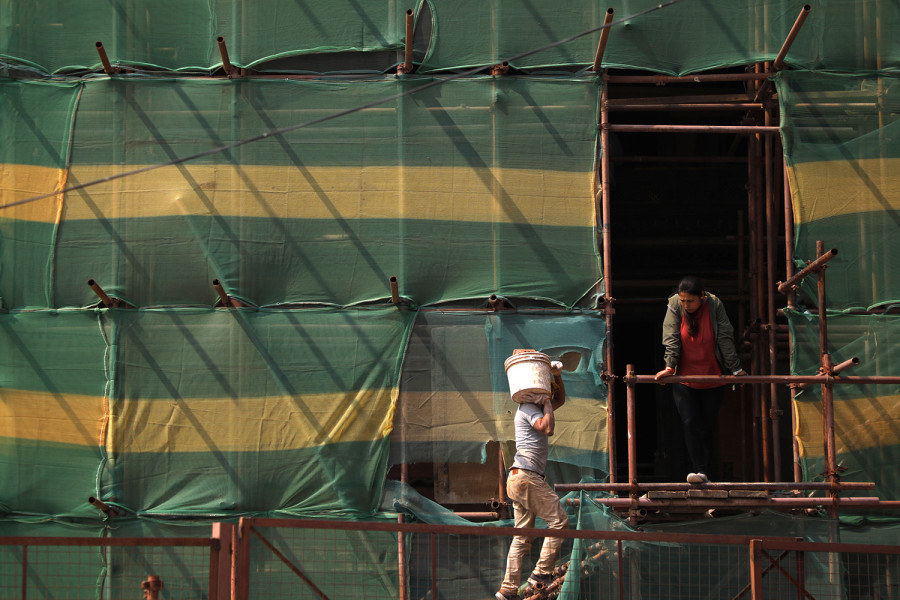National
Create employment opportunities for workers affected due to Covid-19 through new budget, say experts
As workers at home struggle without jobs and tens of thousands of migrant workers are likely to return home, experts suggest the government should be ready to provide jobs through the upcoming budget.
Chandan Kumar Mandal
The government should come up with special programmes aimed at reviving the country’s labour sector, provide relief and ensure employment opportunities for workers as they remain devastated by the Covid-19 pandemic, stakeholders say.
Labour rights activists, employers and government representatives, during an interaction discussing the pandemic’s impact on the country’s labour sector and exploring new areas for accommodating the labour force affected by Covid-19, on Thursday said the government needs to address these emerging challenges through special programmes and policies in the upcoming budget.
According to Pushkar Acharya, president of the Joint Trade Union Coordination Committee (JTUCC), an umbrella organisation of trade unions, workers in the country and Nepali migrant workers abroad have been hit by the global health crisis hard.
“We have seen workers walking on the streets without food and money and struggling to feed their families because employers did not pay them their last month’s salaries,” said Acharya, during the interaction organised by the Labour Employment Journalists’ Group.
“The government’s relief package has not reached them as a majority of them are working in the informal sector. Many have lost their jobs while others are on the verge of losing jobs. It can only get worse if the lockdown continues for some more time.”
According to Acharya, the country might plunge into a grave crisis if tens of thousands of migrant workers start returning home, where jobs are already scarce.
Thousands of Nepali workers from labour destination countries, including India, might return as they have lost their jobs, said Acharya. Once they return home, they need jobs, which is a major challenge for now.
“The next budget should consider employing these workers not only in big infrastructure projects but also explore new sectors. Otherwise, the country might face a huge problem,” Acharya said.
With the ongoing global pandemic, Nepali workers at home and abroad fear losing their jobs.
As the country has been under lockdown for over a month now with international flights banned and labour migration stopped, the country’s overall economic activities have remained suspended as almost all sectors reel under the grip of the pandemic.
While workers at home are languishing without a stable income, Nepali migrants are expected to return, fearing coronavirus infection and after being rendered jobless abroad.
Suspension of labour migration also means a reduced remittance inflow—the source of foreign currency for a country largely dependent on the money sent by migrant workers.
“The priority of this budget will also be different. This year’s budget should be focused on creating employment opportunities for those who have lost their jobs due to Covid-19 or are likely to return from foreign employment,” said Chandra Prasad Dhakal, president of the Employers’ Council under the Federation of Nepalese Chambers of Commerce and Industry.
Dhakal suggested that self-employment schemes and promoting modernised and commercial farming can help the country create new jobs and bring the import-based national economy back to a self-sustaining one.
“Also, the budget should provide relief for the country’ private sector. If they are saved, there will be multiple impacts—existing jobs will be safe, more jobs will be created and employers can sustain the national economy by paying taxes,” said Dhakal.
Ram Kumar Phuyal, a member of theNational Planning Commission who also heads a government task force to study the impact of Covid-19 on remittance and foreign employment, said the government was committed to ensuring health, education and livelihoods of citizens affected due to the pandemic.
First, the government is ensuring public safety and then livelihoods, said Phuyal. “Various ministries are studying potential employment sectors in case migrant workers return home.”
According to Phuyal, the government was considering creating jobs in the agriculture sector, which needs to be more mechanised, commercialised and managed, and also identify other potential areas like manufacturing, construction, trade and domestic tourism.
“We are developing a chart which will give details about the labour force [employed and unemployed], still available and affected employment opportunities due to Covid-19, and whether they were temporarily and permanently affected and their chances of return,” said Phuyal.
“Once we get the numbers, we can suggest what kind of intervention is required to deal with the Covid-19 situation for different scenarios.”




 18.12°C Kathmandu
18.12°C Kathmandu














